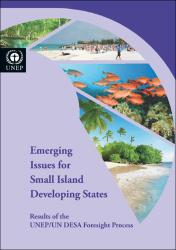| Author | United Nations Environment Programme (UNEP) | |
| Accessioned date | 2023-08-07T00:33:03Z | |
| Available date | 2023-08-07T00:33:03Z | |
| Year | 2014 | |
| Citation | United Nations Environment Programme (UNEP) (2014). Emerging issues for small island developing states. Nairobi, Kenia: United Nations Environment Programme (UNEP). Recuperado de: | es |
| URI | https://bvearmb.do/handle/123456789/3125 | |
| Abstract | In 2013, UNEP identified priority emerging environmental issues that are of concern to small island developing states (SIDS). This report provides an overview of 20 issues critical to the sustainable development of SIDS. The findings reveal that SIDS are faced with several serious environmental challenges, mostly related to climate change, including sea-level rise and loss of biodiversity and ecosystem goods and services. The report also describes opportunities that SIDS have to help them move towards a green economy. For example, they possess both unexploited terrestrial and oceanic natural resources such as minerals, potential pharmaceutical products, renewable energy resources and fish stocks. Renewable energy sources include wind, sun, ocean, wave, hydro and geothermal and use of these resources offers an opportunity to widen access to sustainable energy and reduce the heavy costs of power. The report shows that SIDS have the potential to take a lead in defining models of sustainability and human well-being whilst moving towards a green economy. | es |
| Language | English | es |
| Published | Nairobi, Kenia: United Nations Environment Programme (UNEP) | es |
| Rights | © 2014 United Nations Environment Programme (UNEP). | es |
| Subject | Desarrollo sostenible | es |
| Subject | Cambio climático | es |
| Subject | Biodiversidad | es |
| Subject | Recursos naturales | es |
| Subject | Energías renovables | es |
| Title | Emerging issues for small island developing states | es |
| Material type | Book | es |
| Type of content | Technical report | es |
| Access | Open | es |
| Audience | Technicians, professionals and scientists | es |


